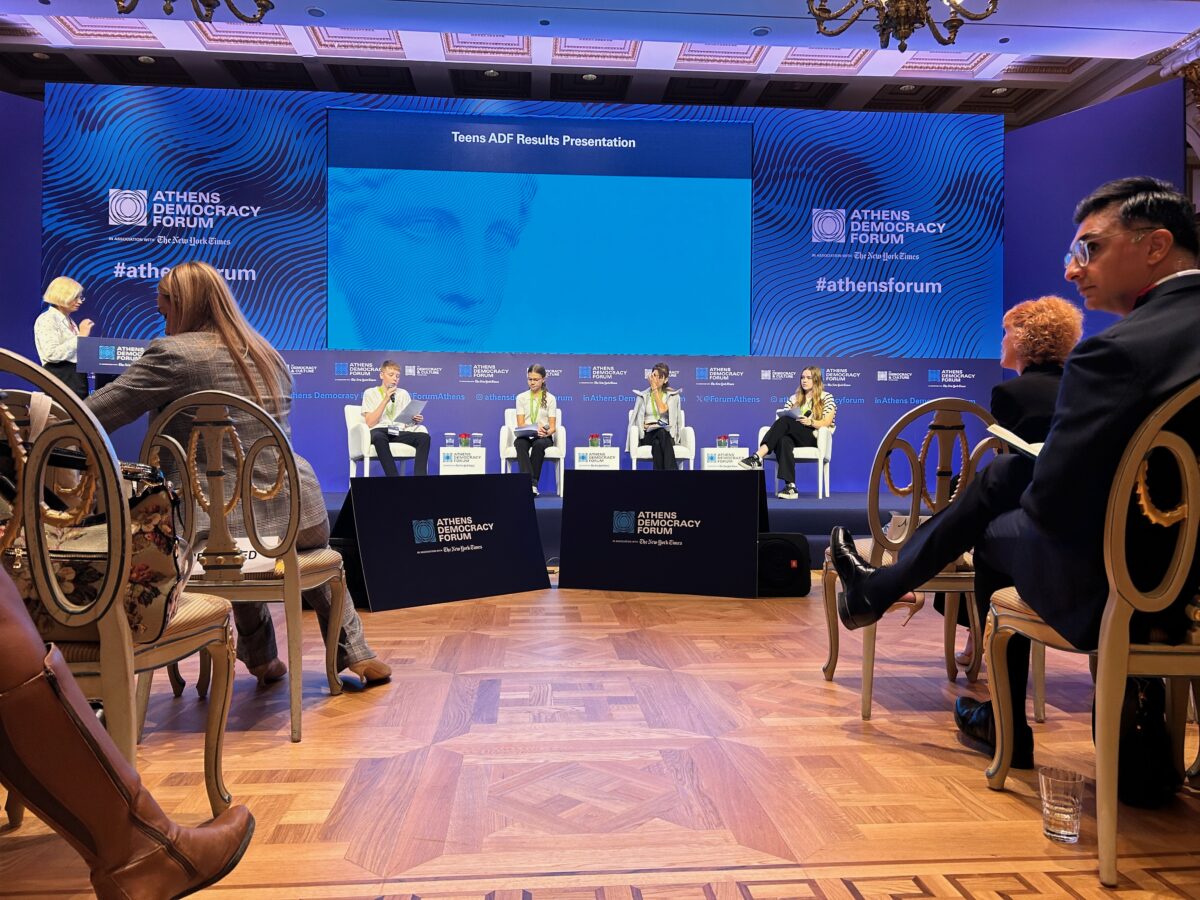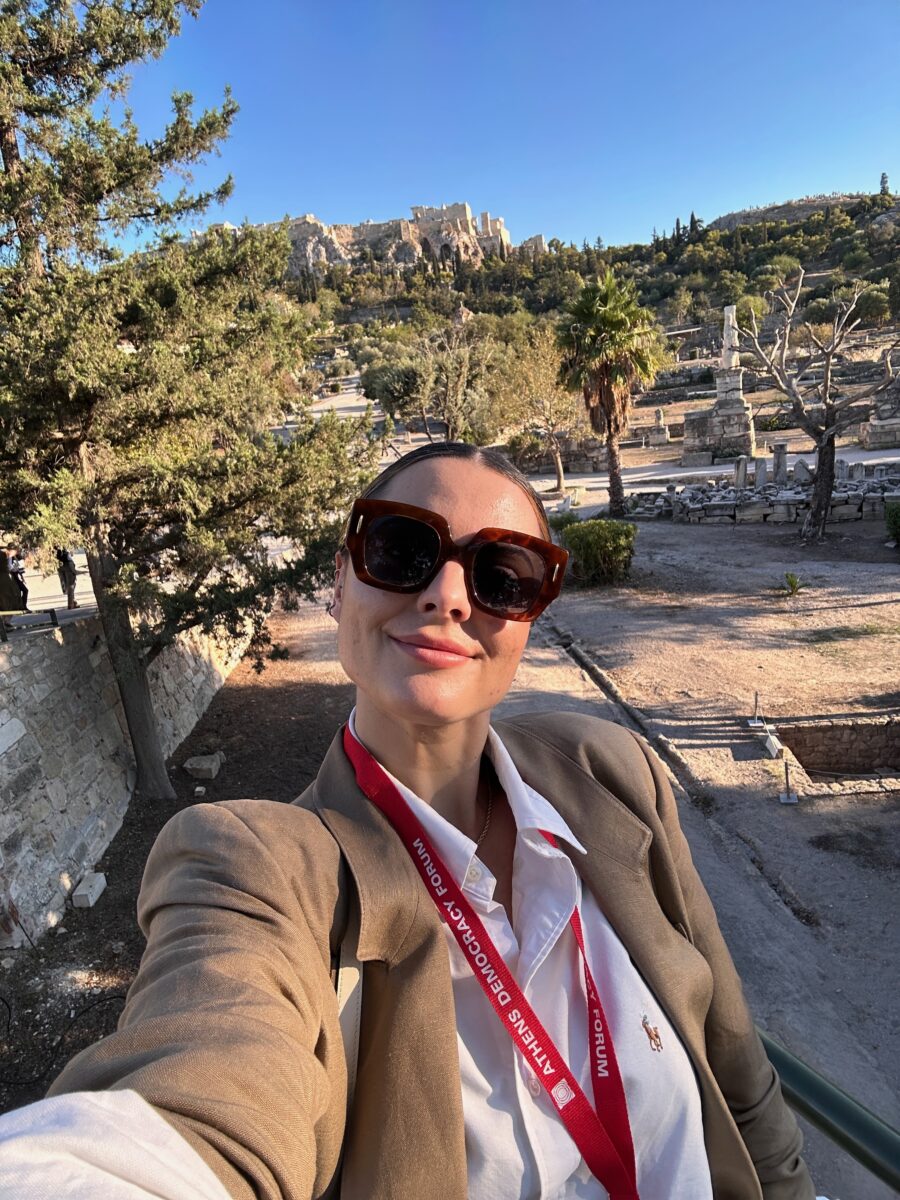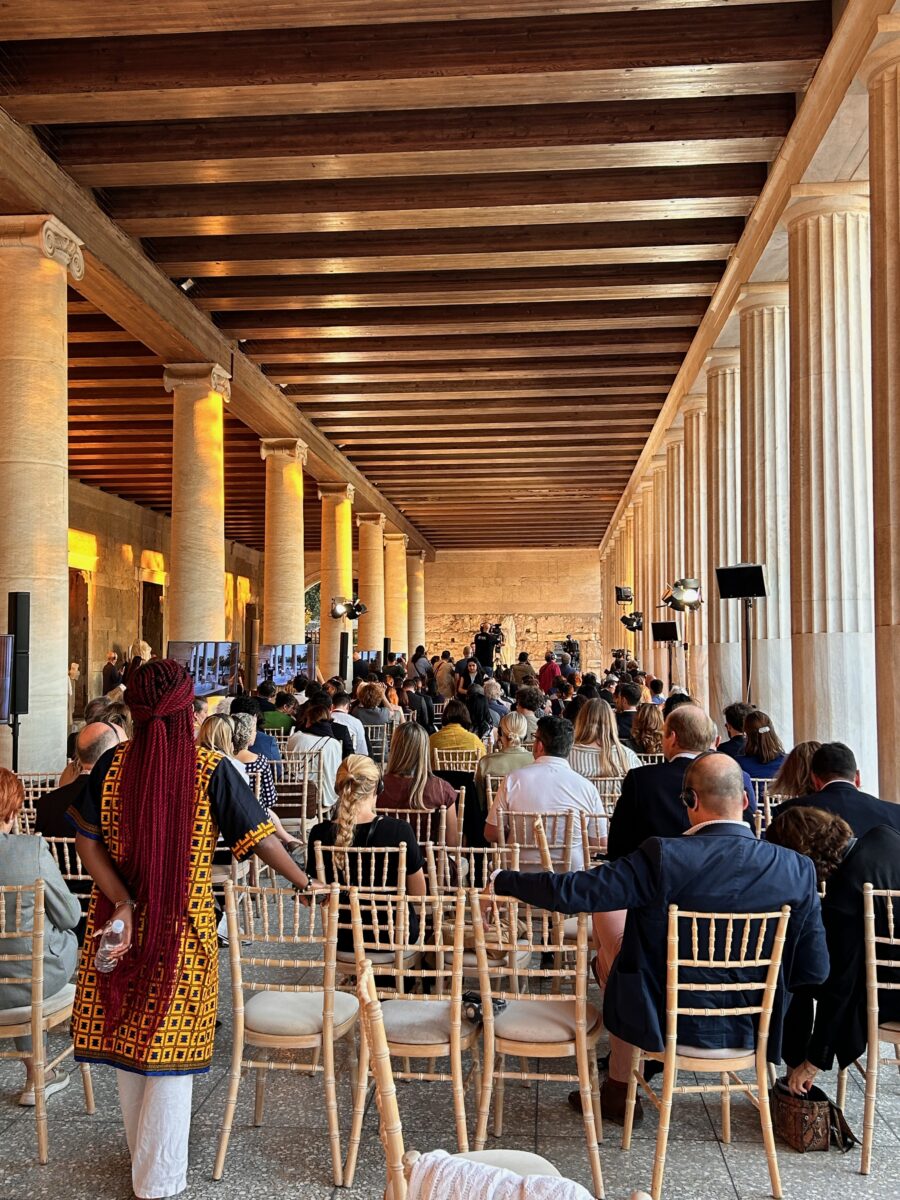The 2024 World Democracy Forum in Athens, entitled “A Moment of Truth”, offered a unique opportunity to address the growing mistrust in institutions and the manipulation of truth in an era dominated by misinformation and manipulation. The forum’s emphasis on finding concrete solutions to these challenges resonated deeply with me. Three major takeaways stood out: the power of inclusive dialogue in bridging divides, the complex role of technology in shaping democratic processes, and the growing potential of gamification as a tool for civic engagement. As we grapple with restoring trust in our democratic systems, these areas emerged as critical for rethinking how we move forward.

Inclusive Dialogue
The Athens Democracy Forum stood out to me as one of the most inclusive events on democracy I have attended. I was stoked to see individuals from all horizons among speakers, panelists, and moderators. Many represented marginalised groups and non-Western ideologies. Alongside public institutions, journalists, and researchers, I was pleased to see stakeholders from non-governmental organisations (e.g. Running Start, Transparency International, BallotWise) and large corporations, for example Google and Microsoft. Incorporating these diverse voices brought out how different sectors intersect with democracy, particularly in shaping public spaces, whether physical or digital. It is thus essential to include them in discussions related to the present and future of democracy, to better understand the role they play and also foster mutual understanding.
The discussions of the Athens Democracy Forum were also inclusive in their representation of individuals of all ages, with delegates as young as 14 years old. I was pleased to see that they were given priority in the questions & answers and that they had a whole panel dedicated to their perspective and proposals. I loved watching the videos they prepared and listening to their thoughts, which were always spot-on. Youth has the advantage of being able to say it like it is, and they often called out hypocrisy and inconsistency. I thought that was brilliant.
Lastly, the Athens Democracy Forum invited people with different ideologies to speak their truth and debate on stage. It was my favourite part of the event: to see people disagree, recognise the validity of others’ viewpoint, and be cordial to one another. I think this is a fundamental and often overlooked part of democracy. Whether it concerned the ethical implications of artificial intelligence, the international world order, or French migration policy, I appreciated the diversity of perspectives. I loved that we discussed the future of Indian democracy and the ongoing conflict in the Middle East. Having hard conversations can be challenging but it is always rewarding. I thought the exchange on AI’s societal impact was a particularly great example of a fruitful debate, with an AI ethics professor and an AI company executive. I learned a lot about the pros and cons of developing technologies in the context of liberal democratic societies.
The key lesson I took away from this diversity of experiences, ages, and perspectives, is that while representation is crucial, it is just as important to empower individuals so that they have equal opportunities to get their point across or see their arguments refuted. Some had many more resources than others to prepare for their interventions, or more at stake in the discussion, which means that the debates were sometimes unfairly skewed in one direction. This can be adjusted by ensuring that individuals are equitably equipped for engagement and faced by people with similar objectives or positions but different ideas on how to get there.



Technology
Building on the idea of diverse voices, technology also plays a crucial role in democratizing or manipulating the narratives in our digital spaces. It was an omnipresent theme at the Athens Democracy Forum. While discussing the impact of artificial intelligence and online platforms, responses to misinformation, or tools to improve engagement in democratic processes, technological development were the subject of both hope and concern. Some speakers (e.g. Nicklas Lundblad, Director of Public Policy at Google DeepMind) highlighted that technology is not inherently bad or good, but that its uses should be framed so that malicious actors cannot use it to cause harm. This argument places responsibility on political actors to regulate certain sectors and technologies, such as artificial intelligence. Other speakers (e.g. Peter G. Kirchschläger, Professor of Ethics at the University of Lucerne and ETH Zürich) noted that companies too have a responsibility in ensuring that their products and services are not ultimately detrimental to humanity, and that their corporate interests are at odds with this.
In addition, the legal framework varies widely between countries. Depending on where companies are based and where services are used, users can have drastically experience of technology. For example, Section 230 of the US Communications Decency Act protects US-based companies from liability for content posted by third-party users on their platforms. This provision, often referred to as the “safe harbor” clause, ensures that internet companies are not held legally responsible for the actions or speech of their users, as long as they comply with certain regulations. However, it does not shield them from liability if they violate federal criminal law, intellectual property law, or engage in conduct that violates civil rights laws. Section 230 has been central to debates on internet regulation, free speech, and platform accountability.
In her exchange with Pamela Paul (Columnist at The New York Times), Meredith Whittaker (President at the Signal Foundation) shared that concerns of surveillance aimed at China-based companies such as TikTok are often misplaced. She explained that similar practices of “surveillance” are also performed by US-based Meta and Dubai-based Telegram, as opposed to Signal which is considered as one of the few truly encrypted messaging apps. What actually may constitute a threat to US actors lies in the usage of the data and the actors who possess it. Having personal data in the hands of the Chinese government or of the US government might make a difference, in aggregate terms, an impact on global geopolitics. This is why it is so important to include private and public actors in discussions about the future of democracy.
Gamification
Gamification was the subject of my speech at the Athens Democracy Forum, but it was also a prevalent subject throughout the conference. Gamification means applying elements of games—like points, levels, and rewards—to non-game contexts, like democracy. It has been used in education, but also health and fitness, as well as online retail, to maximise engagement with digital services and products. However, gamification is not just a way of keeping people engaged. Research shows that integrating game-like aspects in otherwise dull processes increases motivation, interconnectedness, and leads to better learning outcomes. This makes it a valuable tool for civic engagement, which can often feel inaccessible or uninspiring to many citizens. Companies like Deloitte and SAP have already harnessed gamification to train their new employees. They use interactive challenges and badges motivating employees to learn about their company, resulting in higher user engagement and better output. I’d love to see similar results when using gamification to optimise citizen engagement in democracy.
I could see that gamification is a growing trend among democracy thinkers and doers, as I met several activists and non-profit representatives who mentioned using games in their activities to enhance participation, in particular among young audiences. For example, the Democratic Odyssey of the European University Institute, the #NowEurope project of the Bertelsmann Foundation, and the Creative Bureaucracy Festival all use games as part of their participatory and deliberative democracy projects. These types of initiatives are developing fast in Europe, and I would not be surprised if other regional and global organisations similarly seize gamification as a means to improve social engagement with politics.
By 2025, gamification is projected to generate $32 billion in revenue, with $25.7 billion coming from gamified learning alone. It is set to become one of the most prominent trends across industries, especially given the role that AI and machine learning can play to hyper-personalise user experience. Imagine that, in addition to voting every four years in elections, you could get to share your political thoughts on a regular basis through a fun app that rewards you and connects you with other citizens? Blockchain technology can also be used to make gamification safer and more valuable. Digital rewards (like points or badges) gain added value and security when combined with blockchain, as the technology ensures that they are verifiable, authentic, and can be stored, traded, or redeemed.
Gamification techniques aimed at optimising user engagement and data can be used for a myriad of purposes. For profit, they empower private companies to become richer and more influential on the world stage. This has the potential of deepening inequality and therefore haltering the efficient use of resources and health of our global ecosystem. Gamification techniques can however also be used for public good, for example by organisations that are democratically elected and decentralised, hence enhancing accountability and adaptability. It is therefore crucial for democratic institutions and actors to invest in gamification in order to remain influential and relevant actors in the organisation of global society. Gamification’s capacity to increase engagement through technology suggests that our democratic systems can become not only more interactive but also more attuned to the needs of today’s digitally fluent citizens.
Concluding Remarks
As the Athens Democracy Forum demonstrated, this “Moment of Truth” calls for rethinking the democratic systems we rely on. Rebuilding trust in our institutions will require innovative approaches to truth and engagement. Inclusive dialogue, where diverse voices and ideologies are not only represented but empowered, is crucial to fostering mutual understanding. Technology, while a double-edged sword, must be harnessed responsibly to support rather than undermine democracy. Finally, gamification presents an exciting new frontier in making democratic participation more accessible and engaging for all. Together, these elements can help restore the trust and transparency our democratic systems so desperately need.
Sophie L. Vériter

About the Author
Sophie L. Vériter is a PhD candidate in Security and Global Affairs at Leiden University (Campus The Hague), where her research examines the latest developments in misinformation and counter-misinformation policies, in particular in Europe.
Sophie is broadly interested in the relationship between information, technology, and democracy, and the narratives that surrounds information governance. She has been a Europaeum Scholar as well as a Fellow at The Hague Program on International Cyber Security and the Global Governance Institute.
From 2016 to 2018, she designed and launched the ‘Young European Ambassadors’ initiative for the EU’s largest public diplomacy campaign (EU OPEN Neighbourhood). Sophie holds a MPhil in European Politics and Society (Merit) from the University of Oxford and a BA (Summa Cum Laude) from the Brussels School of Governance.



